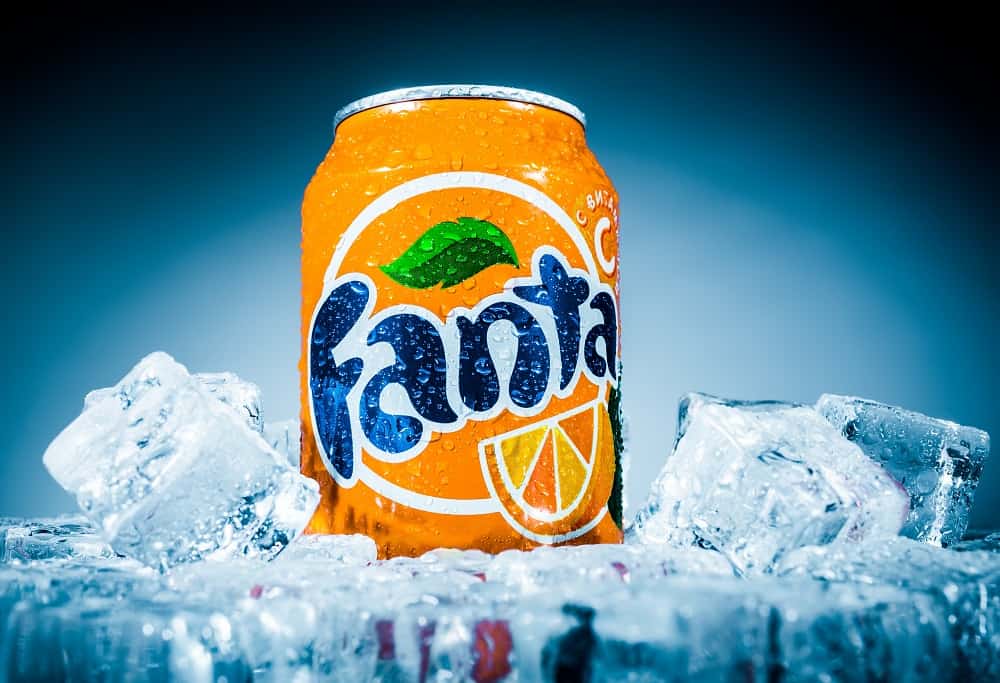Fanta was created in the 1940s in a German Coca-Cola Branch. Due to trade embargoes and limited availability of ingredients (Coca Cola syrup), they were unable to create Coca-Cola (Coke). Essentially, Fanta was created out of necessity in order to keep the plant operational. The original creation of Fanta involved left over apple fiber and whey from cheese makers(1), which is why people wonder if the beverage is vegan or not.
Based on the current ingredient list, Fanta is considered to be vegan as it does not contain any obvious animal products or by-products. However, there are a few ingredients like yellow 6, red 40, and glycerol ester of rosin that some vegans may consider to be gray areas.
Table of Contents
Is Fanta Vegan?

Dietary vegans consider Fanta to be a vegan beverage. The ingredient list does not explicitly include any obvious animal products.
While Fanta may still seem like a gray area for some vegans, it is definitely more vegan than it used to be. Historically, Fanta was made with fish gelatin to stabilize its color.
CocaCola GB notes:
"The vast majority of our drinks, including Coca‑Cola, are suitable for vegetarians and vegans as they do not contain any animal derivatives....This is because a few of our drinks do contain small traces of fish gelatine which is used as a stabiliser for the beta-carotene colour."
Coca-Cola GB
This means that while the modern Fanta is considered to be vegan by some and not by others, the previous version of the drink was by no means vegan.
The official Coca-Cola GB website explicitly states which beverages are non-vegan. These are beverages that use fish gelatin to stabilize beta-carotene.
They also have some beverages that use honey (e.g., Schweppes Indian Tonic Water and Honest Lemon and Honey) and milk (e.g., Costa Coffee Ready-to-Drink Caramel Latte and Costa Coffee Ready-to-Drink Latte, Costa Coffee Ready-to-Drink Americano).
Fanta Ingredients List
The list of ingredients in Fanta includes(3): Carbonated water, high fructose corn syrup, citric acid, sodium benzoate, natural flavors, modified food starch, sodium polyphosphates, glycerol ester of rosin, yellow 6, red 40.
It should be noted that the ingredients list above is the US version. There are different variations based on where you live. To illustrate, Fanta made in the UK has a vastly different ingredient list that includes:
Carbonated water, sugar, orange juice from concentrate (3.7%), citrus fruit from concentrate (1.3%), citric acid, vegetable extracts (carrot, pumpkin), sweeteners (acesulfame K, sucralose), preservative (potassium sorbate), malic acid, acidity regulator (sodium citrate), stabilizer (guar gum), natural orange flavors with other natural flavors, antioxidant (ascorbic acid).
Based on these ingredients, Fanta is technically considered vegan. This is because none of the ingredients listed are sourced from animal products. However, there are some ingredients in that list that some vegans may have issues with.
The problematic ingredients include natural flavors, yellow 6, red 40, sugar, sucralose, and glycerol ester of rosin
Natural Flavors
Natural flavors are considered gray areas because the FDA describes them with a relatively vague definition(4). The definition given by the FDA is as follows:
“The essential oil, oleoresin, essence or extractive, protein hydrolysate, distillate, or any product of roasting, heating or enzymolysis, which contains the flavoring constituents derived from a spice, fruit or fruit juice, vegetable or vegetable juice, edible yeast, herb, bark, bud, root, leaf or similar plant material, meat, seafood, poultry, eggs, dairy products, or fermentation products thereof, whose significant function in food is flavoring rather than nutritional.”
This definitions means that “natural flavors” may or may not be vegan. The manufacturers of beverages also rarely make this distinction.
Food Coloring Agents
Yellow 6 (AKA Sunset Yellow) and red 40 (AKA Allura Red) are both food coloring dyes. These dyes are synthetic meaning they are not derived from animals.
However, food coloring dyes regardless of where and how they were sourced, remain an issue for some vegans. This is because food coloring dyes undergo animal testing.
- Yellow 6 was been tested on rabbits(5), mice, and rats(6).
- Red 40 was tested on Rats, Mice(7), and Caterpillars(8).
Other flavors also use different dyes. While Fanta Orange uses yellow 6 and red 40, Fanta Grape uses red 40 and blue 1, Fanta Strawberry uses red 40, Fanta Pineapple uses yellow 5 and yellow 6, Fanta Peach uses yellow 6 and red 40, Fanta Berry uses blue 1, and Fanta Green Apple uses yellow 5 and blue 1.
Glycerol Ester of Rosin
Glycerol ester of rosin or glycerol ester of wood rosin or ester gum is also a troublesome ingredient. Glycerol ester of wood rosin is an oil-soluble food additive that is used to help keep oils in suspension in water.
Glycerol ester of rosin is made of two things: wood resin and glycerin.
Wood resin is typically obtained from longleaf pines (Pinus palustris) and slash pines (Pinus elliottii) and is considered vegan by both dietary and ethical vegans.
However, glycerin is problematic because it may or may not be vegan depending on how it's sourced. Glycerin can be obtained from two sources: vegetable oil and animal fat.
Understandably, if the glycerin was obtained from vegetable oil, then the glycerol ester of rosin would be vegan. However, it is not usually stated by the manufacturer.
Sugar
Sugar, chemically denoted as sucrose, is a problematic ingredient for vegans. As a product, sugar is primarily derived from sugar cane. The issue with sugar cane is how the sugar industry processes it.
In order to refine and decolorize sugar into the desired white color, it needs to be filtered. A common filter used in the industry is animal bone char – a product made from the bones of animals, usually cows.
It should be noted that there are vegan ways to process sugar. Instead of using animal bone char, some companies use granulated carbon or an ion-exchange system to process their sugar.
Unfortunately, it has proven difficult to confirm how these industries process their products. This is the main reason strict vegans try to avoid sugar in general.
Sucralose
Sucralose is an artificial sweetener and is listed as an ingredient in UK Fanta. Sucralose is very similar to Sucrose; It has the same chemical structure with a few modifications – three of the hydroxyl groups in a molecule of sucrose are replaced with chlorine atoms.
There are two main issues associated with sucralose: The way it's processed and reports of animal exploitation in its creation.
In terms of ingredients, most people consider Sucralose to be Vegan as its made from sugar. Powered sucralose is commonly combined with other plant-based ingredients like corn-derived dextrose and maltodextrin that serve as bulking agents (Splenda).
On Splenda's website:
"Most Splenda Brand products are made without animal or animal by-products – there are three exceptions, including: Splenda Coffee Creamers, Splenda Brown Sugar Blend, and Splenda Diabetes Care Shakes."
Splenda®
There are a number of ways to synthetize sucralose, however the most common involves three processes: esterification, chlorination, and deacetylation. JK Sucralose Inc.'s patent outlines this process: https://patents.google.com/.
Liquid sucralose is also combined with preservatives like sodium benzoate and potassium sorbate and with acidulants such as citric acid and succinic acid.
These processes are all performed using reacting agents that are derived from non-animal sources. Sucralose is commonly filtered with coal derived-ingredients as apposed to animal bone char that is used for sugar cane.
The second issue relates to the potential for animal abuse, which ethical vegans have a problem with. It was reported that an estimated 12,800 animals (dogs, rabbits, mice, and monkeys) died during trials with sucralose.
*Sources for this information are no longer online but can be found via Wayback Machine's Digital Archive:
References:
3. https://www.coca-cola.co.uk/
4. https://www.accessdata.fda.gov/
5. https://www.bibra-information.co.uk/




